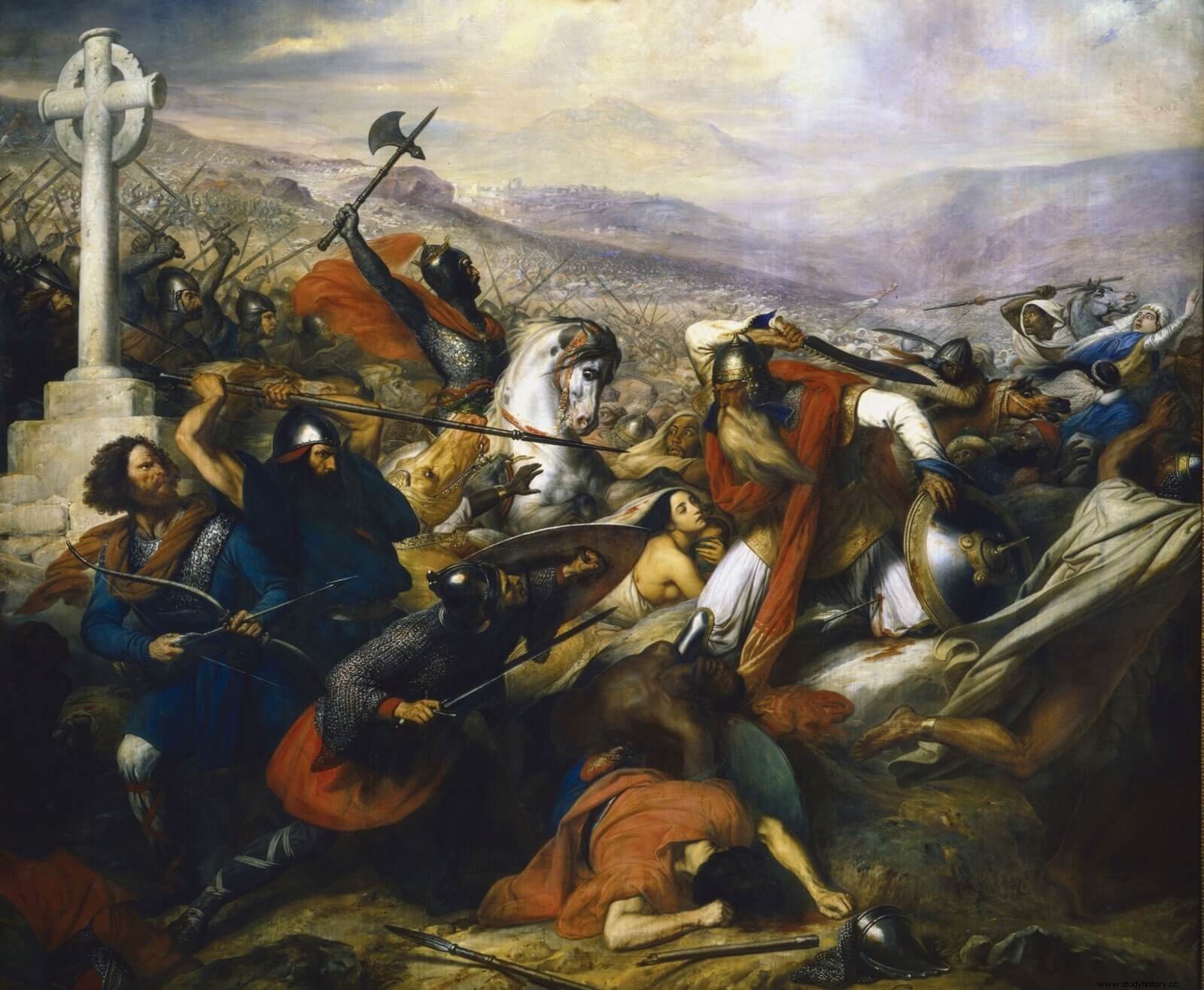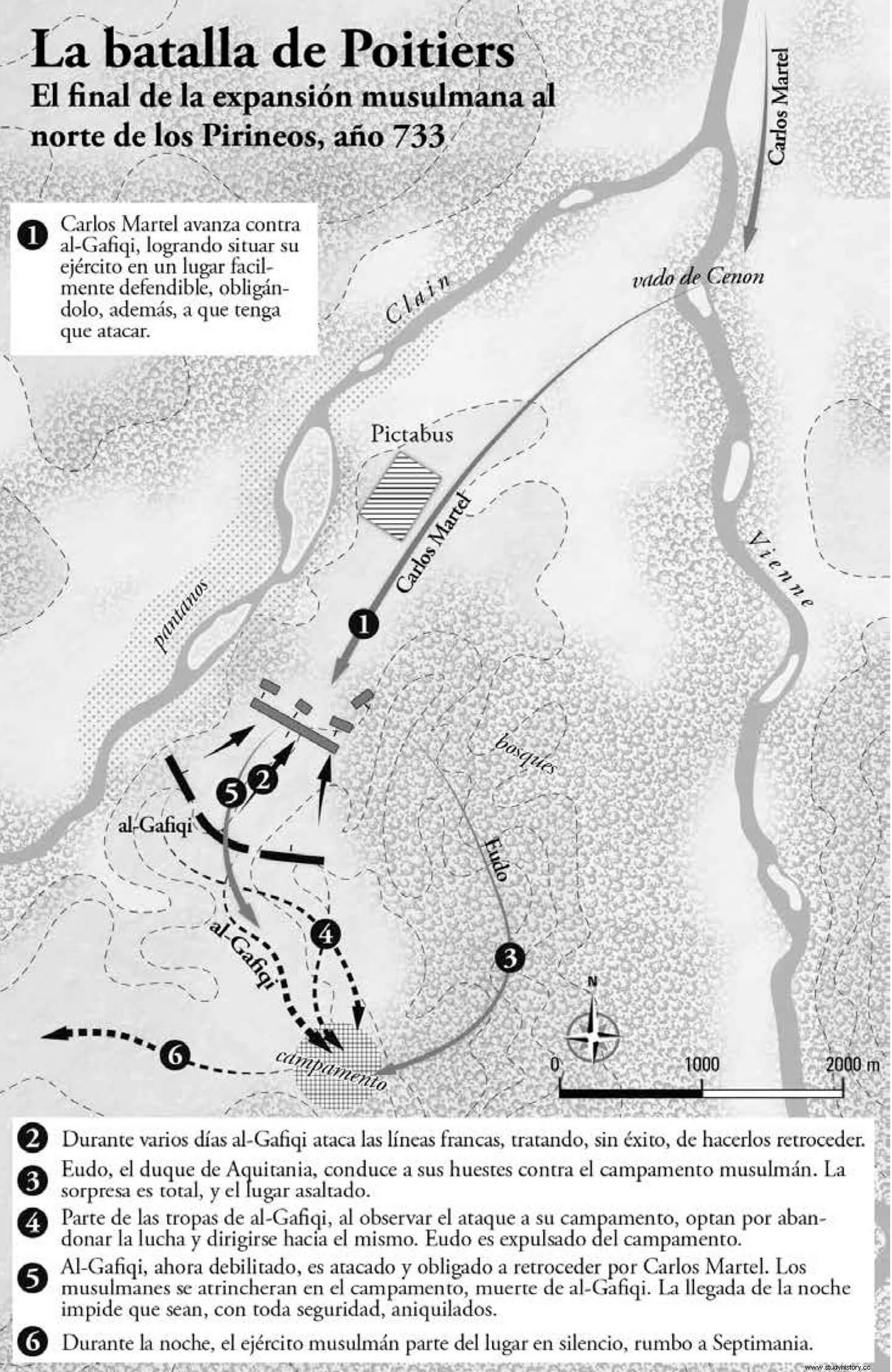
No good news came from nearby Poitiers. Al-Gafiqi had looted the abbey of San Hilario de Poitiers and thoroughly devastated the suburbs and surroundings of the rich city that, sheltered behind its walls, he could not take. He also could not besiege it before eliminating the new enemy army that awaited him on the way to Tours. So al-Gafiqi decided to repeat what he had already tried on the Dordogne River:bypass the city and attack the main force of the enemy. It seemed like a good choice. His men followed him willingly. They were excited about that campaign. After destroying the Aquitanian army in the Dordogne river , the Muslims had spent three months plundering the region at will without encountering resistance:Périgueux, Angoulême and Saintes were razed to the ground and now, leaving behind the smoldering remains of the suburbs of Poitiers and its famous abbey, the Muslims must have believing themselves invincible and, thus, with their heavy baggage, the fruit of months of looting in that immense and rich land, they headed towards the fords of the Clain and Vienne rivers. Charles Martel did not wait for them to get closer to Tours. He raised the field and led his army towards the Vienne, towards the pass of Cenon. While reaching this ford, the Frankish and Muslim advance guards collided at various points:at the so-called "landes of Charlemagne", at Sainte-Catherine-de-Fierbois and, above all, at the ford of Cenon, on the Vienne, which Franks managed to retain after heavy fighting. When the bulk of Charles Martel's army reached the Cenon pass, he crossed it and advanced to a solid position where he could deploy his hosts with flanks and rear well protected by dense woods and by the courses of the Clain and the Vienne, as well as by a swamp located from Moussais-la-Bataille. This was a formidable position that would force al-Gafiqi to launch frontal attacks against the Franks if he wanted to dislodge them and press on to nearby and tempting Tours.
On the other hand, al-Gafiqi had no choice. The dense woods, the swamp, the course of the wide Vienne with its ford of Cenon in the hands of the enemy, did not allow him to flank and fall back towards Poitiers by a road that would force his men to march in a long and exposed line and pass by. to the walls of a city, Poitiers, which he had not taken and where a strong enemy garrison was waiting, was to expose himself to complete disaster. In a few hours and due to Carlos Martel's wise choice of terrain, the Muslim army had gone from being a victorious attacker who seemed unstoppable, to feeling trapped in a mousetrap.
Al-Gafiqi recognized the rush and acted like a good general:he sought a solid defensive position in turn , he found it between two hills, pitched his camp there, fortified it, and deployed his army in the traditional jamis formation. , challenging Carlos Martel and Eudo to a pitched battle and harassing them with the archers of his muqaddama , vanguard, and with simulated attacks and feigned retreats from their qalb , the center of him, of his maymana , or right wing, and his maysara , or left wing, while his saqah , rearguard, guarded the accesses to his camp in which, in addition, he had left a strong guard post to defend the families of the soldiers, their booty and the captives. All this to get the Franks to abandon their strong positions and, attacking the Muslim ones, were pushed back by al-Gafiqi's men who could then counterattack by flanking and crushing them.
The Battle of Poitiers
But the Franks did not move. Seven days passed like this, between skirmishes and feigned attacks. "The wall of ice" of the Frankish warriors did not move . He was still there, with his flanks supported by the dense forests that stretched on both sides of the road and with his front ranks made up of the best of the Frankish host:the scara by Carlos Martel and the leudes and Merovingian nobles. These well-armed warriors were doing what their ancestors were doing when, close by, at Vouillé 226 years ago, they faced the Visigoths of Alaric II:landing on the ground, raising their spears and gathering their shields. Behind his center and right wing were the less well-equipped men and formations of archers and slingers, while behind his right flank a few Armorican horsemen, no more than two hundred, were deployed, and on his left flank stood Eudo. with his Aquitanian knights and with the wild horsemen of his hostis vasconorum .
It was on the eighth day, on an indeterminate date in October 733, that death struck the Caliph's warriors. At dawn, as on the preceding seven days, al-Gafiqi formed the Khamis and sent his archers to harass the Franks. Also like every day before, the Franks, again formed in a shield wall, did not move. Al-Gafiqi then sent his three main divisions of spearmen to take turns attacking the enemy's center and wings. The Franks repulsed these attacks, but did not pursue the Saracens or the Moors, but held their lines with the thick woods guarding their flanks. The fight festered. Berber warriors, undisciplined but ferocious, threw themselves like mad against Frankish shields and spears to die pierced by their points, while the disciplined and better armed muqâtila They locked in tough skirmishes, spear against shield and sword colliding with sword . The Franks held out, and when hard pressed a small contingent of Armorican horsemen emerged from the right flank from the trees and harassed the Muslims with their swift charges, showering spears from their mounts before returning to the ground. forest safety.
The day progressed. The sun was going down and the fighting became general throughout the battle line. Charge after charge, the Muslim infantry crashed into the Frankish shield wall, and the dead and wounded began to number in the hundreds.
Then, with the evening well under way, cries of warning arose from the Muslim rearguard. As the men in the Muslim battle line looked back, they understood why their rear guard was warning them:a dense plume of smoke was rising from where the camp was.
And it is that Eudo, now a Frankish duke again after submitting to Carlos Martel, had led his Aquitanian horsemen and his barbarian Vascones behind the impenetrable forest. These cavalry were a contingent accustomed to riding and fighting in the mountains and forests of the Pyrenees, and here, on the highly disputed borders of Aquitaine and Neustria, the terrain held no secrets for them. They led their horses to the Muslim rearguard , ascended the hill that guarded one of the sides of the enemy camp and, while the bulk of al-Gafiqi's army fought tooth and nail against Carlos Martel's men, they fell on the Muslim camp.
It was protected, it is true, but its defenders were intent on watching the heavy fighting raging before them not far away, and besides, the Muslim camp teemed with Muslim women and children and thousands of Christian captives. It must have been a nice mess. Eudo's horsemen fell on him. Her charge of him was magnificent . They flung their spears at the guards and stormed the barricades that closed off the enemy camp. They couldn't take control of it, of course, but they caused great slaughter among the civilians sheltering there and burned and looted with enough success that there was soon an uproar behind the lines of Muslim fighters. When they saw the smoke and the terrified civilians fleeing from the camp toward them, and thought of the riches they had left in their tents, they couldn't stand it. Perhaps the muqâtila , the professional soldiers, withstood the pressure and kept the ranks, but the Berber volunteers did not. They left the battle and swarmed back to the camp to protect it and their families and wealth.
It was what Carlos Martel had expected. He gave the order and the frank «ice wall» advanced . The muqâtila al-Gafiqi closed ranks and offered resistance, but without the support of the volunteers they could do nothing but delay the enemy's unstoppable progress. Meter by meter, blow by blow, the Muslims backed down.

The rout of the Berbers and other irregular troops had undone the jamis . There was no longer a right wing, or left, or center, or rear, but a confusion of soldiers who were struggling to survive the increasingly accelerated free advance that, step by step, was becoming an infantry charge to which the soldiers began to join. Armorican horsemen. In the camp, the massive influx of irregular fighters from the battle line had allowed the Muslims to expel Eudo's men and regain control over the Muslim camp compound. But it was already late. The disciplined muqâtila they had been pushed into the fortifications surrounding their base and the enemy's determination was so strong that they had even managed to push their enemies inside and fighting was already taking place between the orderly ranks of the Saracen tents. The Franks saw victory as close as the night that was upon them. Then, a spear hit al-Gafiqi in the chest and killed him.
The night saved the Muslims. First, because he hid the death of al-Gafiqi for a few moments, thus avoiding a sudden panic and, second, because Carlos Martel, suspicious of a Muslim counterattack that with the shadows could turn into a disaster for his victorious host, ordered them to retreat. to their positions trampling the corpses that had been lying on the ground after the hard combat. With his dead vale, after receiving a harsh punishment and with the certainty that the next day the Franks would finish what they had started and that the massacre would be general, the Muslim chiefs achieved something that gives a certain idea of the discipline and courage of their best men:the muqâtila .
Without making a sound, they left the camp and headed for Poitiers, abandoning tents, supplies, booty, and captives. During the early morning they passed by Poitiers. A troop defeated, scared and with nothing but weapons . The victorious army that eight days ago intended to sack Tours and complete a brilliant campaign that would be the beginning of the annexation of a new province to the caliphate of Damascus, now only intended to escape alive.
Bibliography
- Soto Chica, J. (2019):Empires and barbarians. War in the Dark Ages. Madrid:Awake Ferro Editions.
- Soto Chica, J. (2019):The Visigoths. Children of a furious god. Madrid:Awake Ferro Editions.
